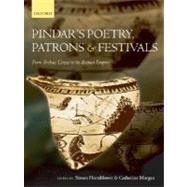Pindar's Poetry, Patrons, and Festivals From Archaic Greece to the Roman Empire
, by Hornblower, Simon; Morgan, Catherine- ISBN: 9780199296729 | 0199296723
- Cover: Hardcover
- Copyright: 5/3/2007
Pindar's Poetry, Patrons, and Festivals is about the commemoration of athletic victory in Archaic and Classical Greece, and the reception of that heritage in the Hellenistic and Roman worlds. At its heart lies the praise ('epinikian') poetry of the Classical poet Pindar and his near contemporary Bacchylides, composed to celebrate victories at the four great festivals, at Olympia, Delphi, Nemea, and Isthmia. The collection, which originated in an international research seminar held in London in 2002, brings together literary, historical, archaeological, and anthropological specialists to consider issues such as the origin and nature of epinikian poetry, the poets' patrons and the regional significance of victory odes, and the post-Classical reception of Pindar and his contemporaries. After a long thematic introduction covering such topics as Pindar and Greek religion, the book is divided into three sections. Part One is about the Classical festivals, the poetry written for them, the genre, style, and performance of epinikian poetry, and the two competing and complementary media through which victories were commemorated: statues and poems. Part Two examines the various communities which patronized poets: Argos and Corinth, the west (mainly Sicily), Aigina and Thessaly (the Introduction covers two other great 'Pindaric' regions: Cyrenaica and Boiotia). Part Three continues the story into the Hellenistic and Roman periods, considering Hellenistic praise poetry as a bridge between the Classical and Roman worlds, and Roman responses to Greek athletic festivals. In conclusion, the doyenne of British social anthropology, Mary Douglas, looks at ancient games and praise poetry from a modern anthropological perspective. Book jacket.






